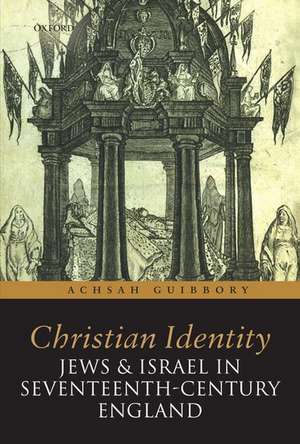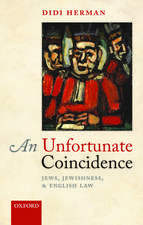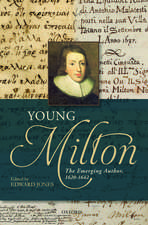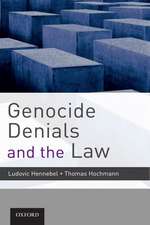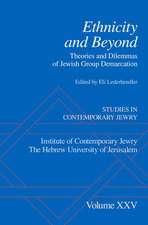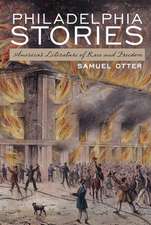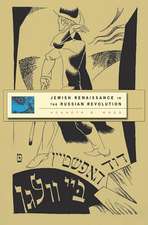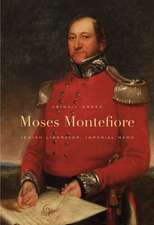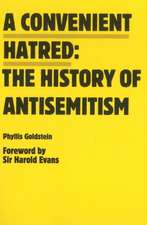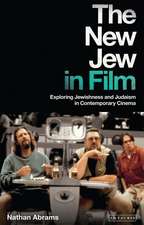Christian Identity, Jews, and Israel in 17th-Century England
Autor Achsah Guibboryen Limba Engleză Hardback – 23 sep 2010
Toate formatele și edițiile
| Toate formatele și edițiile | Preț | Express |
|---|---|---|
| Paperback (1) | 294.98 lei 31-38 zile | |
| OUP OXFORD – 26 sep 2013 | 294.98 lei 31-38 zile | |
| Hardback (1) | 805.80 lei 31-38 zile | |
| OUP OXFORD – 23 sep 2010 | 805.80 lei 31-38 zile |
Preț: 805.80 lei
Preț vechi: 1156.94 lei
-30% Nou
Puncte Express: 1209
Preț estimativ în valută:
154.23€ • 166.48$ • 129.32£
154.23€ • 166.48$ • 129.32£
Carte tipărită la comandă
Livrare economică 07-14 aprilie
Preluare comenzi: 021 569.72.76
Specificații
ISBN-13: 9780199557165
ISBN-10: 0199557160
Pagini: 342
Ilustrații: Frontispiece and 10 black-and-white halftones
Dimensiuni: 163 x 241 x 25 mm
Greutate: 0.68 kg
Editura: OUP OXFORD
Colecția OUP Oxford
Locul publicării:Oxford, United Kingdom
ISBN-10: 0199557160
Pagini: 342
Ilustrații: Frontispiece and 10 black-and-white halftones
Dimensiuni: 163 x 241 x 25 mm
Greutate: 0.68 kg
Editura: OUP OXFORD
Colecția OUP Oxford
Locul publicării:Oxford, United Kingdom
Recenzii
Christian Identity, Jews, and Israel in Seventeenth-Century England will be de rigueur reading for anyone interested in understanding the tightiy interwoven connections between sacred and secular literature and history as well as religion's major role in shaping English national identity.
This is an important book that significantly advances our understanding of Judaism's role in the formation of early modern Christianity. It breaks new ground in several areas and should be regarded as indispensable for anyone seeking to understand seventeenth-century English culture.
[A] fine book, a major contribution to the understanding of Early Modern literature, religion, and history, showing many unexpected, revelatory links between works of different kinds.
Guibbory's work stands as a notable achievement.
[A] large and important book ... It consistently stimulates thought. It should be essential reading for anyone interested in seventeenth century England, literature and history, the history of religion, and interfaith relations.
Guibbory's study offers a rich, original, and well-researched account of the Hebrew Bible and the history of the biblical Jews as they were interpreted in seventeenth-century England ... This outstanding study deserves to be widely read by scholars and students of early modern English history, religion, and literature.
[An] important book ... Should be essential reading for anyone interested in seventeenth-century England, literature and history, the history of religion, and interfaith relations.
Achsah Guibbory ... brings to the field refreshing insight ... a forceful study that demonstrates that writing English history without the Jews deprives the subject of an important aspect that would have been instantly recognized by people who lived there then.
Christian Identity is remarkable for its determination not to subscribe to any one, simple grand narrative - the map it offers is complex ... what distinguishes this outstanding book and the best kind of history is its judicious fullness and the self-awareness that enables the author not to occlude the alterity of the past even as it denies her the ideal she longs for.
Well researched, thoroughly accessible and carefully structured, Christian Identity presents an important argument about some of the ways that early modern Christians constructed their identity in relation to Israel and the Hebrew Bible.
This stimulating book adds a distinctly literary perspective to the growing body of scholarship... These high notes are well prepared by the pleasingly eclectic variety of literary resources upon which Guibbory draws. The book elegantly shows how apologists and critics of the English Church throughout the turbulent seventeenth century shaped its future identity through encounter with the Jewish past.
Guibbory deftly bridges the traditional academic disciplines of literary criticism, history, and religious studies to substantiate some very specific claims about the formation of early modern Christian identities. She suceeds in this endeavor both because of her astute critical judgments about how to weigh the textual evidence and also because of her years of painstaking archival reseach...This is an important book both because of its explicit recognition of the complexity and fluidity of Christian identity and also because of what it reveals about the specific ways the Reformation precipitated a renegotiation of the relations between Christianity and Judaism in the West.
The great achievement of Christian Identity is to show just how ubiquitous discussion of Judaism was in this period, it reveals that all - Anglicans, Puritans, monarchists, republicans - drew deeply on the Old Testament in their discussions of everything from politics to religion to social life. The book also shows the deep ambivalence at the heart of much of this: many who were willing to celebrate the ancient Jews were equally happy to dismiss their modern descendants with disgust.
This is a rich, detailed picture of the Jewish aspects of British culture
In Christian Identity ... Achsah Guibbory provides a comprehensive account of early modern English attitudes toward biblical and postbiblical Jews. The complexity of Guibbory's analysis exposes the reductiveness of many prior statements about Christian-Jewish relations in the period. ... This is a richly detailed book that deserves to be read in its entirety.
Christian Identity is a major contribution to early modern scholarship. ... The most rewarding books transform the reading experience of the field through new or reworked concepts, paradigms and methodologies, and Christian Identity, by confounding neat formulations of the otherness of Jews and exposing the effusions of Englishness in the crucible of Judaism and the narrative of Israelite biblical history, succeeds in doing precisely that.
take[s] the reader through a dazzling array of identifications and interactions ... [a] magnificent account.
[Guibbory] has created a compelling narrative that allows the reader to move seamlessly to a broader understanding of the seventeenth century and its significance in molding later attitudes.
In this study, she [Achsah Guibbory] examines the extent to which biblical Israel, Jewish history and Judaism played a role in shaping Christian identity in England in the century or so between the reign of Elizabeth I and the Restoration of the Monarchy ... Yet, while identification with Israel serves as the theme which runs throughout this study, arguably its greatest strength is that it remains highly sensitive to the different ways in which this was interpreted by different groups, in large part as a result of their respective agendas.
This is an important book that significantly advances our understanding of Judaism's role in the formation of early modern Christianity. It breaks new ground in several areas and should be regarded as indispensable for anyone seeking to understand seventeenth-century English culture.
[A] fine book, a major contribution to the understanding of Early Modern literature, religion, and history, showing many unexpected, revelatory links between works of different kinds.
Guibbory's work stands as a notable achievement.
[A] large and important book ... It consistently stimulates thought. It should be essential reading for anyone interested in seventeenth century England, literature and history, the history of religion, and interfaith relations.
Guibbory's study offers a rich, original, and well-researched account of the Hebrew Bible and the history of the biblical Jews as they were interpreted in seventeenth-century England ... This outstanding study deserves to be widely read by scholars and students of early modern English history, religion, and literature.
[An] important book ... Should be essential reading for anyone interested in seventeenth-century England, literature and history, the history of religion, and interfaith relations.
Achsah Guibbory ... brings to the field refreshing insight ... a forceful study that demonstrates that writing English history without the Jews deprives the subject of an important aspect that would have been instantly recognized by people who lived there then.
Christian Identity is remarkable for its determination not to subscribe to any one, simple grand narrative - the map it offers is complex ... what distinguishes this outstanding book and the best kind of history is its judicious fullness and the self-awareness that enables the author not to occlude the alterity of the past even as it denies her the ideal she longs for.
Well researched, thoroughly accessible and carefully structured, Christian Identity presents an important argument about some of the ways that early modern Christians constructed their identity in relation to Israel and the Hebrew Bible.
This stimulating book adds a distinctly literary perspective to the growing body of scholarship... These high notes are well prepared by the pleasingly eclectic variety of literary resources upon which Guibbory draws. The book elegantly shows how apologists and critics of the English Church throughout the turbulent seventeenth century shaped its future identity through encounter with the Jewish past.
Guibbory deftly bridges the traditional academic disciplines of literary criticism, history, and religious studies to substantiate some very specific claims about the formation of early modern Christian identities. She suceeds in this endeavor both because of her astute critical judgments about how to weigh the textual evidence and also because of her years of painstaking archival reseach...This is an important book both because of its explicit recognition of the complexity and fluidity of Christian identity and also because of what it reveals about the specific ways the Reformation precipitated a renegotiation of the relations between Christianity and Judaism in the West.
The great achievement of Christian Identity is to show just how ubiquitous discussion of Judaism was in this period, it reveals that all - Anglicans, Puritans, monarchists, republicans - drew deeply on the Old Testament in their discussions of everything from politics to religion to social life. The book also shows the deep ambivalence at the heart of much of this: many who were willing to celebrate the ancient Jews were equally happy to dismiss their modern descendants with disgust.
This is a rich, detailed picture of the Jewish aspects of British culture
In Christian Identity ... Achsah Guibbory provides a comprehensive account of early modern English attitudes toward biblical and postbiblical Jews. The complexity of Guibbory's analysis exposes the reductiveness of many prior statements about Christian-Jewish relations in the period. ... This is a richly detailed book that deserves to be read in its entirety.
Christian Identity is a major contribution to early modern scholarship. ... The most rewarding books transform the reading experience of the field through new or reworked concepts, paradigms and methodologies, and Christian Identity, by confounding neat formulations of the otherness of Jews and exposing the effusions of Englishness in the crucible of Judaism and the narrative of Israelite biblical history, succeeds in doing precisely that.
take[s] the reader through a dazzling array of identifications and interactions ... [a] magnificent account.
[Guibbory] has created a compelling narrative that allows the reader to move seamlessly to a broader understanding of the seventeenth century and its significance in molding later attitudes.
In this study, she [Achsah Guibbory] examines the extent to which biblical Israel, Jewish history and Judaism played a role in shaping Christian identity in England in the century or so between the reign of Elizabeth I and the Restoration of the Monarchy ... Yet, while identification with Israel serves as the theme which runs throughout this study, arguably its greatest strength is that it remains highly sensitive to the different ways in which this was interpreted by different groups, in large part as a result of their respective agendas.
Notă biografică
Achsah Guibbory is Ann Whitney Olin Professor of English at Barnard College, Columbia University. Before coming to Barnard in 2004, she was Professor of English at the University of Illinois, where she was also affiliated with the Program in Religious Studies. Author of numerous articles and essays on seventeenth-century culture and literature, especially on Donne and Milton, her most recent books are Ceremony and Community from Herbert to Milton (Cambridge UP, 1998) and her edited Cambridge Companion to John Donne (Cambridge UP, 2006). Her research for Christian Identity, Jews, and Israel in Seventeenth-century England was supported by fellowships from the National Endowment for the Humanities and the Guggenheim Foundation.
